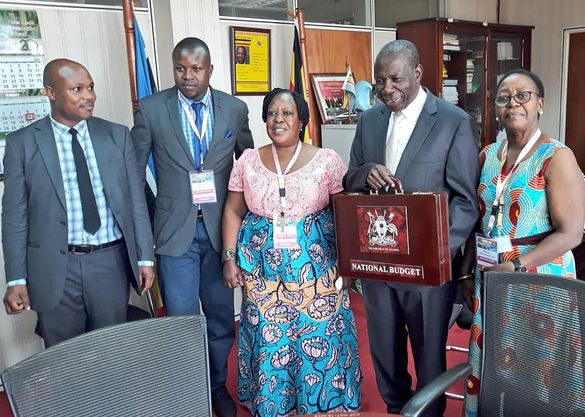
Legislators have approved a shs44.7 trillion budget for the 2021/2022 financial year, which has seen a decrease of shs714 billion for the first time compared to the approved resource envelope of 2020/2021.
According to the report of the Budget Committee, the drop this financial year is largely attributed to the projected decrease of shs2.4 billion in external financing for project support.
The report, presented during a plenary sitting chaired by Speaker Rebecca Kadaga on 7 May 2021 stated that the resource envelope is expected to be financed by domestic revenue constituting 76.7 per cent and 23.3 per cent of external revenue.
“It should be observed that shs200 billion will be drawn from the Petroleum Fund to specifically finance oil road infrastructure during financial year 2021 /22,” said Hon. Amos Lugoloobi, the Chairperson of the Budget Committee.
Rule 148 (2&3) was suspended to allow for the passing of the Appropriation Bill at the third reading without debate on sectoral committee reports that arise out of consideration of policy statements.
In the approved budget for 2021/2022, sector allocations see Defence take Shs3.4 trillion, Uganda National Roads Authority shs3.1 trillion, Ministry of Health Shs1.4 trillion , Ministry of Gender Labour and Social Development shs1 trillion and Ministry of Agriculture Shs500 billion.
Lugoloobi reported that the greatest share of resources is towards debt related payments, inclusive of domestic arrears at 38 per cent.
“Safeguarding debt sustainability should be prioritized. In this regard, there is need for continued domestic revenue mobilisation and sound project implementation especially to realise the envisaged growth dividend from infrastructure investment,” Lugoloobi reported.
Hon. Muwanga Kivumbi (seated) compares notes with Hon. Robert Centenary
Hon. Muhammad Muwanga Kivumbi (DP, Butambala County) and Hon. Cecilia Ogwal (FDC, Dokolo district) however, presented a minority report citing several areas of dissent including debt servicing burden, inadequate agriculture sector development and the Parish Development Model.
Muwanga Kivumbi argued that servicing debts accrued as a result of low absorption by ministries, departments and agencies is a wastage of resources.
“Parliament should not approve loans for ainistries, departments and agencies that have absorption rates lower than 60 per cent at the time of the request,” Muwanga Kivumbi said.
The minority report recommended that the shs200 billion allocated to the Parish Model should be reallocated to the reviving of cooperatives, following the discovery that the programme was wanting.
“Oversight by the Committee on Public Service and Local Government revealed that the project is almost invisible in the communities and requires forensic audit. Such projects ought to be considered as pilots and basis of drawing lessons before initiating and allocating funds to the proposed parish development model,” Muwanga Kivumbi added.
During debate on the Budget Committee report, lawmakers also raised concern on the implementation of the Parish Development Model saying that the beneficiaries need to be sensitized about the programme before it is rolled out.
“We have ignored the function of community mobilisation and yet we have allocated funds to the Parish model to people who are not prepared to utilize these funds,” said Hon. Agnes Taaka Wejuli (NRM, Bugiri district).
The Minister of State for Finance (Planning), Hon. David Bahati said that one of the key issues in the budget is the Parish Development Model, adding that if implemented in a phase manner, it will directly put money in the hands of the 3.2 million households who live in a subsistence economy.
“This will strengthen our security, maintain peace and expand infrastructure. It will generate more energy, which is a catalyst for industralisation that we need to create jobs,” said Bahati.
He also assured the MPs that government will ensure value for money and a sustainable debt level in the short and long term.
Kadaga tasked the Ministry of Health to give a time frame on the reconstruction of the old regional referral hospitals as well as increased funding.
“When the Minister comes in the next financial year, they must be able to answer such questions so that the country knows that we raised these issues, the government picked them up and will be able to address them,” said Kadaga.
According to the Public Finance Management Act (PFMA), 2015, Parliament is mandated to approve the National Budget by 31st May.
